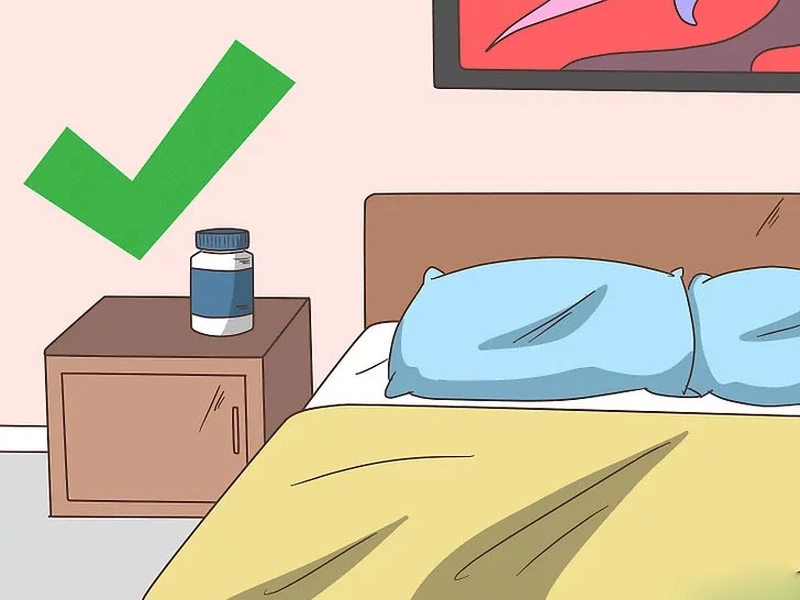Vitamin A is a fat-soluble vitamin that is important for vision, growth and development, and maintaining epithelium. Vitamin A can be combined with other vitamins or separately in pharmaceutical preparations. So how to preserve vitamin A so that the product always maintains the best quality? Read the article below for the answer.
Vitamin A is a fat-soluble vitamin that acts as a powerful antioxidant in the body. It plays an important role in maintaining vision, nerve function, healthy skin, and more. Vitamin A is often quite expensive, so you should know how to preserve vitamin A to avoid waste.
Effects of vitamin A on human health
Vitamin A has many benefits for human health. Specifically as follows:
Protect your eyes
One of the most famous benefits of vitamin A is its ability to improve vision and keep your eyes healthy. This is because vitamin A is an important component of rhodopsin (which helps send visual signals to the brain). Beta-carotene plays a role in preventing macular degeneration, one of the main causes of age-related blindness.

One of the most well-known benefits of vitamin A is its ability to improve vision and keep your eyes healthy.
Contributes to immune support
Vitamin A plays an important role in immune defense and is especially helpful in preventing illness and infections. One study found that a deficiency in this essential vitamin can weaken the immune system and even alter the function of immune cells.
Anti-inflammatory
Beta-carotene acts as a powerful antioxidant in the body, helping to reduce the buildup of harmful free radicals and prevent cellular oxidation, while also inhibiting inflammation. Inflammation is the cause of many chronic diseases, from cancer to cardiovascular disease and diabetes. Reducing inflammation levels may also reduce the risk of neurodegenerative diseases such as Alzheimer’s and Parkinson’s.

Reducing inflammation levels may also reduce the risk of neurodegenerative diseases like Alzheimer’s
Helps keep skin healthy
Vitamin A is trusted and used by dermatologists to treat acne and wrinkles. A study by the Department of Dermatology at the University of Michigan Medical School even showed that applying vitamin A (retinol) to the skin significantly improved the appearance of wrinkles. It also increased the skin’s ability to withstand trauma, preventing the development of dermatitis or skin allergies.

A study by the Department of Dermatology at the University of Michigan Medical School found that topical retinol significantly improved the appearance of wrinkles.
Contribute to human development
Vitamin A is important for growth at all stages of life and is also considered one of the best vitamins for women. In particular, vitamin A deficiency weakens the immune system, increasing the rate of illness and death in women. Vitamin A deficiency even increases the risk of HIV transmission from mother to child in pregnant women.
Suggestions for some ways to preserve vitamin A
You should learn how to preserve vitamin A, which will help the product to maximize its effects. Some suggestions on how to preserve vitamin A that you can apply are:
Do not store in the bathroom
Many people store vitamins in the bathroom. However, the results of many studies show that the reason for weakening the effectiveness of vitamins is due to humidity in the bathroom. In humid conditions, vitamins are reduced in quality and shelf life, this phenomenon is called melting.

In the humid conditions of the bathroom, vitamin A tends to melt.
Do not store vitamin A in the refrigerator
Vitamins and minerals can be destroyed when stored in the refrigerator. The refrigerator environment is mostly cool and dark but the humidity is very high, when we open and close the vitamin bottle, it will make it easier for moisture to penetrate. Therefore, the refrigerator is not suitable for storing vitamin A.
Do not store vitamin A near the stove or sink
Moisture and grease in the kitchen caused by the cooking process affect the quality of vitamin A. After each use of the stove and oven, the temperature and humidity in the kitchen often fluctuate, affecting the structure of vitamin A. You can store them in a dry wardrobe, separate from the stove and sink.
Can store vitamin A in the bedroom
Vitamin A is easily oxidized, especially in the light. Vitamins should be kept away from open windows or direct sunlight. Do not store the product near radiators or other heat sources. The bedroom is a place with stable humidity and cool, dry conditions, suitable for ideal storage of vitamin A.

The bedroom is a good place to store vitamin A.
Use a sealed container to better preserve vitamin A
Vitamin A should be stored in a tightly sealed container to prevent moisture from reducing the quality of the product. When using the product, it is better not to open the original packaging. Choose a dark, dark colored container to better prevent and protect the vitamin from the effects of sunlight. Make sure to always close the lid of the storage container tightly to prevent moisture from entering.
Read the product label before use
The instructions on the product label show how to use vitamin A and where to store it. Before use, we must read the product label. The product label also helps provide information about the recommended dosage and shelf life of the product.
Keep vitamins and supplements out of reach of children
All vitamins can be harmful if taken by children. Therefore, this product should be kept in a cabinet or on a high shelf in a locked cabinet so that children cannot touch it.
Do not use expired vitamin A
With good preservation of vitamin A, we can maintain the effectiveness of the product for a long time. Expired products should be avoided and not used.
Some side effects when using vitamin A
After learning about how to preserve vitamin A effectively, you should also know about the common side effects when using this vitamin to better protect your health. Because using vitamins can cause allergic reactions if you are allergic to any of the ingredients of the drug.
Seek immediate medical attention if you have any of the following symptoms: Rash, difficulty breathing, swelling of the face, lips, tongue or throat.
In addition, using high doses or long-term vitamin A can cause unwanted effects such as:
- Diarrhea;
- Drowsiness;
- Dermatitis, scaly skin;
- Loss of appetite;
- Dizziness;
- Aching bones and joints;
- Increased calcium levels in the blood.
However, not everyone who uses vitamin A experiences side effects. If you notice side effects while using vitamin A, notify your doctor immediately.

Dizziness is one of the unwanted effects when using vitamin A.
How to take vitamin A properly?
To get the most vitamin A, use it as directed on the label or as directed by your doctor. The most common way to supplement vitamin A in this case is to swallow capsules or tablets. If you are using liquid vitamin A tablets, measure the medicine with a separate measuring cup or measuring device instead of a standard spoon. You should also be careful not to use more or less than the recommended amount.
The above article has guided you through some effective ways to preserve vitamin A, ensuring the safest and highest quality, avoiding vitamin A spoilage or waste. Good luck!





